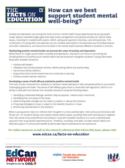How does parent involvement in education affect children’s learning?
Parents’ involvement in children’s education has several forms. Parents who are behaviourally involved participate in activities such as attending school functions and volunteering at the school. Parents who are cognitively involved expose their children to stimulating activities and materials, such as reading books or visiting cultural institutions. Parents who are personally involved communicate positively with their children about school matters. They convey that they value school and expect their children to as well.
Many studies report on the effects of parent involvement on children’s standardized achievement test scores, school grades, and school-based behaviour. What is the effect of parent involvement on children’s learning? Answers depend on the type of parent involvement, type of learning outcome, and characteristics of families.
As a whole, research suggests parents can have a positive effect on children’s learning by being involved in their schooling. However,
- Parent involvement has a greater impact on elementary students than on secondary students.
- Involvement of minority parents has more impact than the involvement of parents from the cultural/ethnic majority.
- Involvement of parents of low socioeconomic status has greater impact than involvement of parents of high socioeconomic status.
- Parent involvement has a greater impact on school grades than on standardized achievement test scores.
- Parents’ personal involvement has more impact on children’s academic outcomes than parents’ behavioural involvement.
- Although parents’ behavioural involvement has little effect on children’s academic achievement it helps prevent behaviour problems.
Canadian educators and policy makers should continue to encourage and support parent involvement in education with particular attention to minority and low-income parents. All stakeholders, including parents, should be aware that the most effective form of involvement for supporting children’s learning is personal involvement; that is, parents communicating positively with children about school to convey that they value education and expect their children to as well.
References
Cheung, C.S. & Pomerantz, E. M. (2012). Why does parents’ involvement enhance children’s achievement? The role of parent-oriented motivation. Journal of Educational Psychology, 104, 820-832.
Davis-Kean, P.E. (2005). The influence of parent education and family income on child achievement: The indirect role of parent expectations and the home environment. Journal of Family Psychology, 19, 294-304.
Domina, T. (2005). Leveling the home advantage: Assessing the effectiveness of parental involvement in elementary school. Sociology of Education, 78, 233-249.
Epstein, J. (2001). School, family, and community partnerships. Boulder, CO: Westview Press.
Froiland, J. M., Peterson, A. & Davison, M L (2013). The long-term effects of early parent involvement and parent expectation in the USA. School Psychology International, 34, 33-50.
Gonida, E. N. & Cortina, K.S. (2014). Parental involvement in homework: Relations with parent and student achievement‐related motivational beliefs and achievement. British Journal of Educational Psychology, 84, 376-396.
Graves, S. L. Jr. & Wright, L B (2011). Parent involvement at school entry: A national examination of group differences and achievement. School Psychology International, 32, 35-48.
Jeynes, W.H. (2005). A meta-analysis of the relation of parental involvement to urban elementary school student academic achievement. Urban Education, 40, 237-269.
Jeynes, W.H. (2007). The relationship between parental involvement and urban secondary school student academic achievement: A meta-analysis. Urban Education, 42, 82-110.
Jeynes, W.H. (2011). Parental involvement research: Moving to the next level. The School Community Journal, 21, 9-18.
Patall, E.A., Cooper, H., & Robinson, J.C. (2009). Parent involvement in homework: A research synthesis. Review of Educational Research, 78, 1039-1101.
Pomerantz, E M, Kim, E M, & Cheung, C S (2012). Parents’ involvement in children’s learning. In Harris, K. R., Graham, S., Urdan, T., Graham, S., Royer, J. M., & Zeidner, M. (Eds). APA Educational Psychology Handbook, Vol 2: Individual differences and cultural and contextual factors. Washington, DC, US: American Psychological Association, pp.417-440.
Tan, E.T. & Goldberg, W.A. (2009). Parental school involvement in relation to children’s grades and adaptation to school. Journal of Applied Developmental Psychology, 30, 442-453.
Toren, N. K. (2013). Multiple dimensions of parental involvement and its links to young adolescent self‐evaluation and academic achievement. Psychology in the Schools, 50, 634-649.
Resources
http://www.edu.gov.on.ca/eng/parents/involvement/

